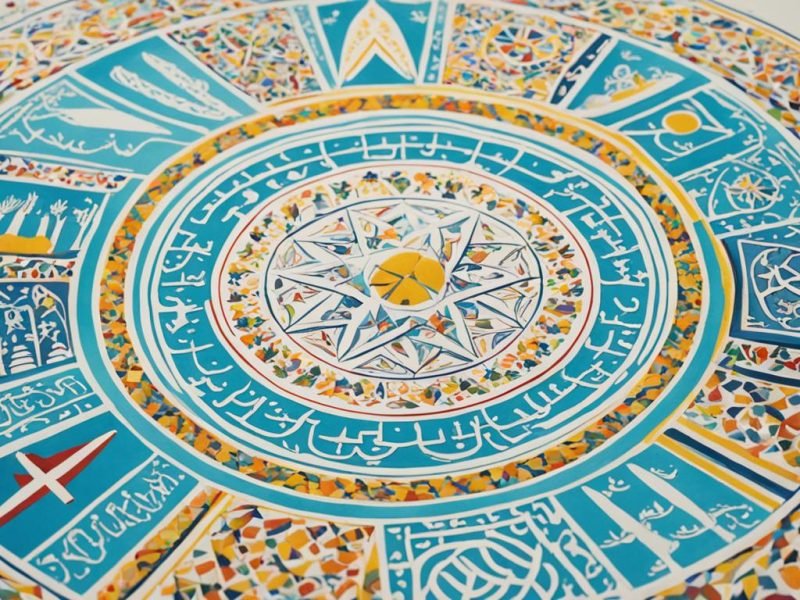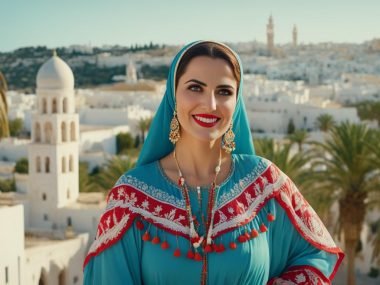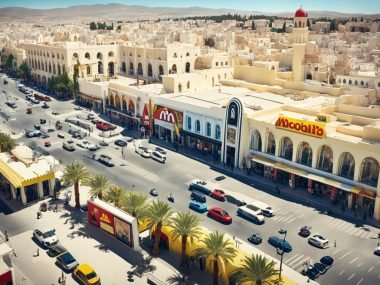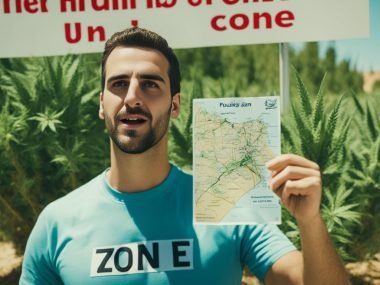Did you know nearly all people in Tunisia are Muslim? About 58% follow Sunni Islam. The other 40% just say they’re Muslim. Even though Islam is the main religion, the country’s laws allow for other religions. But, there are some limits.
Tunisia has small numbers of Christians, Jews, and Bahá’í followers too. They add colour to Tunisia’s culture. Major Islamic events are also big national holidays.
Key Takeaways
- 99% of the Tunisian population identifies as Muslim.
- 58% of Tunisian Muslims are Sunni, with the rest not specifying a sect.
- The Tunisian constitution declares Islam as the state religion.
- Despite this, Tunisia houses Christian, Jewish, and Bahá’í communities.
- Islamic holidays like Eid al-Adha, Eid al-Fitr, and Mawlid are national holidays.
Overview of Religious Demography in Tunisia
Most people in Tunisia follow Islam, making up about 99% of its people. But, the country is also home to small groups of Christians, Jews, and those who follow the Bahá’í Faith. Together, these groups make up less than 1%.
Introduction to Tunisia’s Religious Landscape
Tunisia is known for its religious diversity. Islam is the main faith, but the country is open to other religions too. This shows Tunisia values the presence of different religions.
Population Statistics
Here are some numbers about the religious make-up of Tunisia:
| Religion | Percentage of Population |
|---|---|
| Muslim | 99% |
| Christian | 0.2% |
| Jewish | 0.1% |
| Bahá’í | < 0.1% |
Each religious group in Tunisia has its own special celebrations. Muslims enjoy holidays like Eid al-Adha and Eid al-Fitr. At the same time, Christian and Jewish communities keep their unique traditions.
Islam: The Predominant Faith
In Tunisia, Islam is very important in society. It shapes how people live and think. Most people follow Sunni Islam, the biggest group there.
Sunni Islam Majority
About 58% of Muslims in Tunisia follow Sunni Islam. This group has a big effect on the country’s traditions and laws. Following Sunni beliefs changes how Tunisia works and its rules.
Sufi Islam Subgroup
The Sufi group in Tunisia is known for its special way of practising Islam. But, since the country became independent, there are fewer Sufis. The government now looks after many Sufi places and checks on what they do.
Mosque Regulation and Government Involvement
The government in Tunisia keeps an eye on mosques. Mosque Regulation Tunisia means the government helps pay for mosques, chooses imams, and sets times for prayers. This helps make sure everyone follows Islam the same way across Tunisia.
Islamic Holidays in Tunisia
Eid al-Adha, Eid al-Fitr, and Mawlid are big holidays in Tunisia. These Islamic holidays Tunisia bring everyone together. The whole country celebrates these special days, showing their unity in faith.
Christianity in Tunisia
Christianity started in Tunisia during the Roman era. But, Islam’s arrival led to fewer Christians. Yet, Christianity has stayed in the country.
Historical Background and Introduction
Under Roman rule, many Christians lived in Tunisia. But their numbers fell with Islam’s arrival. The communities left have kept their traditions, adding to Tunisia’s religious mix.
Christian Denominations
In Tunisia, you’ll find different Christian groups. Most Christians are Roman Catholics. There are also Protestants, Evangelicals, and Orthodox Christians. They all have their own ways of worship.
Churches and Institutions
The Archdiocese of Tunis is key for Roman Catholics in Tunisia. It looks after churches, schools, and cultural activities. Though fewer, Protestants and Evangelicals have their own communities too. Tunisia’s Christian places offer worship and help, creating a strong sense of belonging.
Christian Population Statistics
The International Religious Freedom Report says there are about 30,000 Christians in Tunisia. This small, active group keeps their faith alive. They hold services in churches or homes, keeping their spirit strong despite being a small number.
| Denomination | Est. Population | Main Institutions |
|---|---|---|
| Roman Catholic | 20,000 | Archdiocese of Tunis |
| Protestant | 8,000 | Various churches in Tunis and Sousse |
| Evangelical | 1,500 | Private group services |
| Orthodox | 500 | Church of St. George in Tunis |
Judaism in Tunisia
The Jewish community in Tunisia has deep roots, dating back over 2,600 years. Even with fewer people, their presence is strong, especially in Djerba. This place is key for religious and cultural events.
Jewish Historical Presence
The Tunisia Jewish community has a rich history from centuries back. Though numbers have fallen, their cultural impact endures. Their heritage continues to make a mark.
The Jewish Community of Djerba
Djerba stands out for Tunisia’s Jewish community. It hosts the El Ghriba Synagogue, one of the world’s oldest. Every year, it draws many visitors, highlighting its importance in Jewish practices in Tunisia.
Religious Practices and Cultural Events
In Tunisia, Jews blend religious acts with cultural events. They run religious practices and educational stuff. They keep synagogues and schools going, aiming to preserve their deep heritage, even as their numbers drop.
| Aspect | Description |
|---|---|
| Historical Significance | Over 2,600 years in Tunisia, especially in Djerba |
| Main Hub | Djerba, with the El Ghriba Synagogue |
| Current Population | Approximately 1,500 |
| Religious Practices | Cultural events, private religious schools, synagogue maintenance |
The Baháʼí Faith in Tunisia
The Bahá’í Faith came to Tunisia in the early 20th century. This community is important even though it’s not very big. They have a special role in Tunisia’s religious scene.
Establishment and Early Years
The faith came to Tunisia around 1910. It was hard to be recognised and set things up. By 1963, there weren’t many Bahá’ís, but the faith had started to grow.
Current State of the Bahá’í Community
Now, there are about 150 to 2,400 Bahá’ís in Tunisia. They don’t have official status, but they are still strong. The community keeps going, showing their faith without official support.
| Year | Estimated Population | Recognition Status |
|---|---|---|
| 1910 | Unknown | No |
| 1963 | Minimal | No |
| Present | 150 – 2,400 | No |
Even with these challenges, the Bahá’í community in Tunisia creates unity. They add to Tunisia’s culture and religious life.
Religious Diversity in Tunisia
Tunisia is religious tolerant because many religions live there. Most people are Muslim, but Christians, Jews, and Bahá’í people are there too. This mix shows Tunisia’s open attitude towards all religions. Islam is still the main religion.
I think this mix shows religious tolerance in Tunisia well. Having many religions makes Tunisia’s culture rich. It shows how different faiths have got along for years.
Here is a short list:
| Religious Group | Approximate Population | Key Locations |
|---|---|---|
| Muslims | 99% of the population | Nationwide |
| Christians | 30,000 | Major cities such as Tunis |
| Jews | 1,500 | Djerba |
| Bahá’í | 150 to 2,400 | Various locations |
Tunisia works hard to keep religious diversity. It recognizes holidays from other religions and supports talks between faiths. People can follow their religion, but there are rules. Tunisia’s many religions show its tolerance and respect. This is very important for Tunisia’s society.
The Increase of Non-Religious Identification
In Tunisia, more young people are not following a religion. This country loves its Islamic roots. But now, people are thinking differently about religion.
Growing Non-Religious Sentiment
A lot of Tunisians now say they don’t follow a religion. Back in 2013, only 12% said this. By 2017, that number jumped to 33%. Young people and new ideas from the world are making a big difference.
Societal Attitudes and Surveys
The Arab Barometer shows that not as many people in Tunisia are very religious now. This has started many talks in the country. Even with more people not following a religion, not everyone is happy about it. It shows that people are torn between old and new beliefs.
Research now hints that this change might not last. The studies show how people’s views on religion in Tunisia keep changing. It’s a constant back-and-forth between older religious ways and new ideas.
Major Religious Groups in Tunisia
Tunisia’s religious life is mostly about Islam. It guides the country’s rules and way of living. But there are other religions too. They add to Tunisia’s varied culture.
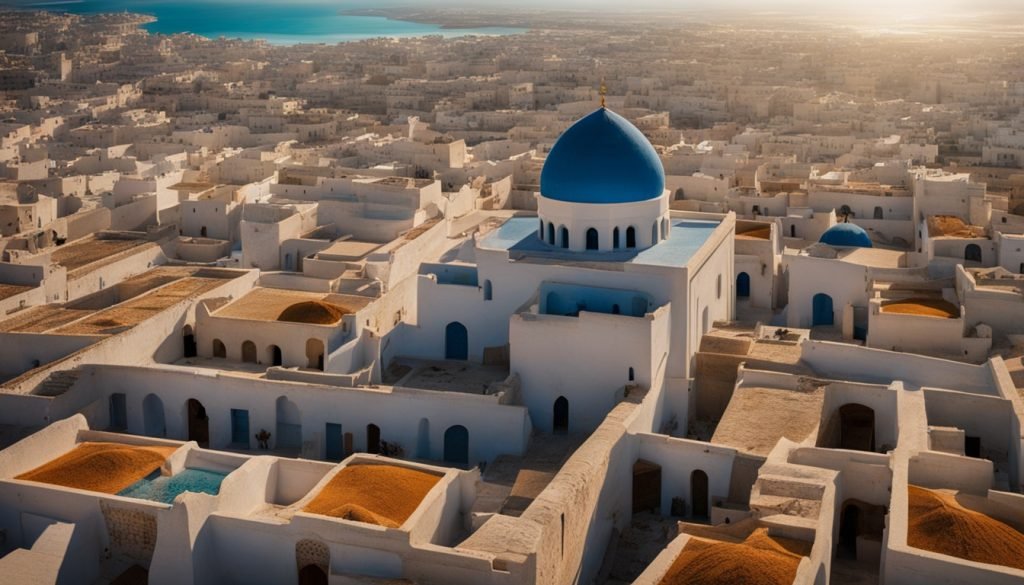
Role of Islam
Islam is Tunisia’s main religion. Most people are Muslim, mainly Sunni. It’s a big part of their daily life and what makes them Tunisian.
Christian and Jewish Communities
Christians and Jews are fewer in Tunisia, but they’ve been there a long time. Christians have their churches. Jews, though fewer, still have a strong community in Djerba. It’s a special place for them.
Both groups keep their traditions alive. They help make Tunisia’s culture richer.
Minorities and Their Representation
Besides Islam, Christianity, and Judaism, there are smaller groups like Baháʼí Faith in Tunisia. They’re small but keen to keep their ways and beliefs alive.
Even though it’s not easy for them, they do get some help from the state. It helps them keep their cultures alive and be part of Tunisia’s diverse religious scene.
Legal Framework and Religious Freedom
The Tunisian constitution strikes a balance. It sees the state both guarding religion and valuing personal freedoms. This balance is key to understanding Tunisia’s legal system and its impact on citizens.
Constitutional Provisions
In Tunisia, the constitution ensures religious freedom. Yet, it names Islam as the state religion. This is laid out in Article 1 and Article 6.
These parts protect belief freedom. They also respect the country’s Islamic roots. Thus, they mark the boundaries for religious activities in Tunisia.
Restrictions and Government Policies
Government policies and social norms limit religious freedom on the ground. The state has a big role in religion, funding and managing religious settings. This merges government work with religious practices.
Societal pressures matter a lot too. Take Ramadan. If you don’t fast, you might face issues in public. Creating a party based on religion is also tough. And quitting Islam can lead to social troubles. This shows the gap between constitutional ideals and reality.
The Tunisian legal system tries to mix religious freedom with a state-backed religious identity. However, challenges arise due to societal and policy restrictions.
Tunisia’s Muslim Population
The Muslim community is very important in Tunisia. Most people follow Sunni Islam. They are a big part of the country’s culture.
Demographic Details
About 99% of people in Tunisia are Muslim. Most are Sunni. Some follow Sufism and other paths. Muslims impact many areas of life there.
Religious Practices
In Tunisia, Islamic rules are part of the law. The government looks after mosques and appoints imams. They also help celebrate major Muslim festivals like Eid al-Adha and Eid al-Fitr.
Here’s a quick look at some important points:
| Aspect | Details |
|---|---|
| Major Religion | Sunni Islam |
| Minor Islamic Groups | Sufism, Other Islamic Traditions |
| State Regulation | Government regulation of mosques, appointment of imams |
| Islamic Holidays | Eid al-Adha, Eid al-Fitr |
Christian Institutions and Activities
In Tunisia, Christian institutions are part of a rich faith mix. They include Catholic, Protestant, Russian Orthodox, and Anglican groups. Even though Christians are fewer here, their church activities add much to Tunisia’s life.
Types of Churches
Different churches meet Tunisia’s Christian spiritual needs. The big Roman Catholic Church is looked after by the Archdiocese of Tunis. It runs lots of churches and community projects. Protestant and Evangelical churches also do a lot, even if they’re smaller in number.
Russian Orthodox and Anglican churches bring their own traditions. They make the religious scene more varied.
Services and Charitable Work
Christian churches in Tunisia do more than hold services. They do a lot of charity work, helping those in need. This includes education, health care, and support. They do this despite some legal limits.
Their dedication shows how important Christian groups are in Tunisia. They really help bring the community together.
| Church Denomination | Key Activities |
|---|---|
| Roman Catholic | Religious services, educational programmes, cultural events |
| Protestant | Community services, worship gatherings |
| Russian Orthodox | Liturgical services, charity work |
| Anglican | Worship services, outreach programmes |
The Jewish Community: Past and Present
The Tunisia Jewish community has a special spot in Tunisia’s history and culture. Their history goes back over 2,600 years, mainly in places like Djerba. Today, their numbers are smaller, but they keep their culture and traditions alive.
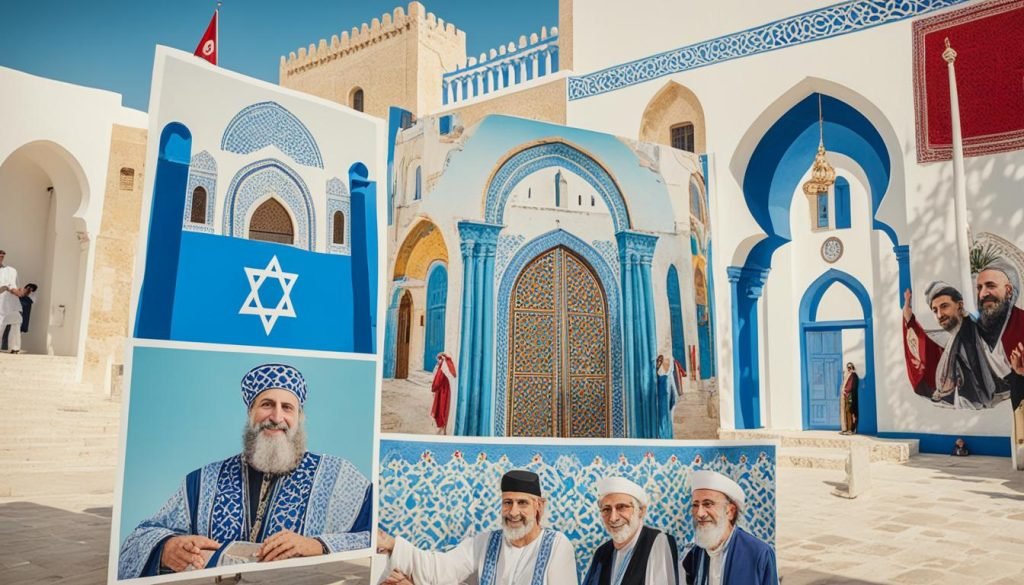
Every year, the Tunisia Jewish community makes a trip to the El Ghriba synagogue in Djerba. It’s a key event that brings people from all over. It shows the strength and ongoing story of this old community.
Now, there are about 1,500 Jewish people in Tunisia, mostly in Djerba. Even with few in number, they celebrate their faith and culture. They have celebrations, rituals, and learning events. They’re dedicated to keeping their unique culture alive in a mainly Muslim place.
To sum up, the Tunisia Jewish community‘s tale is rich with history and current day courage. Their cultural and religious activities show their strong spirit. They play a big part in Jewish history Tunisia.
Challenges Faced by Religious Minorities
In Tunisia, religious minorities have a tough time. They can’t freely follow their beliefs. This is due to things like society not liking changes in faith. Also, only Islam gets full legal status.
Societal Pressures
People following less common religions in Tunisia face many challenges. Family and friends may not like if someone stops following Islam. This leads many to keep their new beliefs a secret.
Those who aren’t Muslim or have different beliefs struggle a lot. They try to balance their own beliefs while living in a mainly Muslim community. They often keep quiet about their faith to avoid problems.
Governmental Restrictions
The government doesn’t officially recognize religions other than Islam. This makes it hard for other religious groups. They can’t easily organize or have their own worship places.
Because of no legal status, these groups have a hard time standing up for themselves. They can’t fully keep their cultural and religious ways alive. So, they often don’t get noticed much in the country.
To help, Tunisia needs to understand the importance of religious freedom. It should welcome everyone’s faith equally. This way, every religion gets the same chance and respect.

